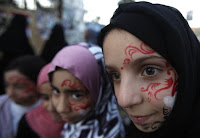 Nine al-Qaida militants and two Yemeni soldiers were killed in separate incidents in a southern provincial capital that is partly under militant control, a Yemen security official said Tuesday.
Nine al-Qaida militants and two Yemeni soldiers were killed in separate incidents in a southern provincial capital that is partly under militant control, a Yemen security official said Tuesday.The nine al-Qaida militants were killed overnight in the port city of Zinjibar. Residents and the military said they discovered the charred bodies of the men and suspected the U.S. Navy was behind the attack.
The United States had no immediate comment, but has long said its navy does not shell targets in Yemen.
Al-Qaida's branch in the Arabian Peninsula is one of the group's most active and has been accused of planning attacks from its Yemeni bases that in the United States and elsewhere. The attacks were unsuccessful.
The United States has carried out drone strikes in Yemen, most notably killing a prominent al-Qaida figure, Yemeni-American cleric Anwar al-Awlaki, in September.
The official, speaking on condition of anonymity in line with military regulations, said the two Yemeni soldiers died in clashes with al-Qaida-linked militants. He said no militants were killed in the exchange of fire in Abyan's provincial capital of Zinjibar.
Last year, militants took advantage of the country's political turmoil to overrun Zinjibar, forcing more than 100,000 people to flee to neighboring provinces.
Security forces have taken back control of parts of the city, but have failed to dislodge the militants entirely.
A deal for longtime President Ali Abdullah Saleh to hand over power has failed to quell the violence after months of political unrest that continues to roil the impoverished Arab country since February.
Tens of thousands of women dressed in traditional black robes and full face veils took to the streets of the capital Sanaa and at least five other provinces to demand that Saleh, who has ruled for 33 years, be put on trial for the deaths of hundreds of protesters last year. For nearly a year, Yemenis have staged daily pro-democracy protests.
Under the deal, brokered by Yemen's powerful Arab Gulf neighbors, Saleh is granted immunity from prosecution in exchange for turning over power to his deputy. The deal allowed formation of a national unity government, comprised of an equal number of opposition and loyalist ministers.
On Tuesday, the government ruled to change the country's official two off days starting next month. The new weekend will be Friday and Saturday, as opposed to Thursday and Friday. The new weekend falls in line with most of the Arab world. Friday is the traditional Muslim day of prayer.
Calls to change the weekend had been floated under Saleh but were thwarted under pressure from hard-line Islamists who argued that changing the days would Westernize Yemen's conservative society.
The government said Tuesday it decided to push the weekend back one day in order to give local businesses and ministries more time to deal with "the outside world," particularly banks and other financial institutions.
